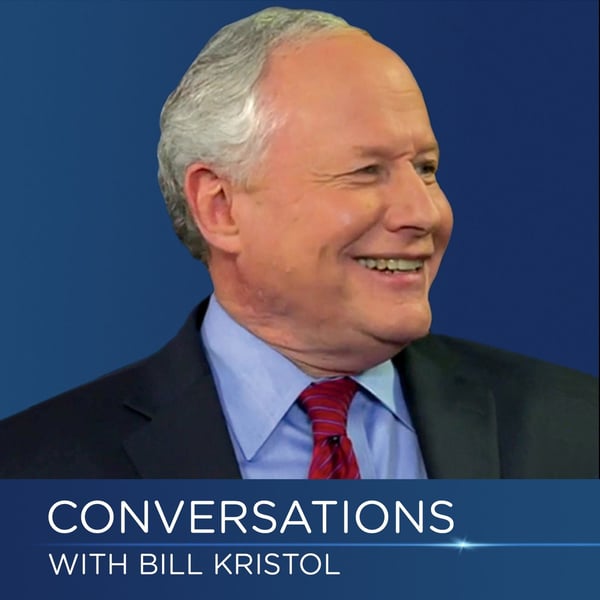Harvey Mansfield: On Political Philosophy
Conversations with Bill Kristol
Conversations with Bill Kristol
4.7 • 1.7K Ratings
🗓️ 16 July 2021
⏱️ 83 minutes
🧾️ Download transcript
Summary
Transcript
Click on a timestamp to play from that location
| 0:00.0 | Hi, I'm Bill Crystal. Welcome to Conversations. Today we're going to the archives for our very first conversation with government professor Harvey Mansfield. |
| 0:08.0 | We taped this back in 2013, and I asked Harvey, one of our most distinguished students of political philosophy, to reflect on his career. |
| 0:16.0 | Why study political philosophy? Give us a little account of Aristotle, Machiavelli, Burke, Tocqueville, and he does a wonderful job. |
| 0:23.0 | And I think you'll really enjoy this conversation, which you may not have heard the first time, or if you heard it the first time, you should hear it again. |
| 0:29.0 | In the intervening years, we've done almost 20 other conversations with Harvey, some on those different thinkers and greater depth, |
| 0:36.0 | and others on other subjects from the Federalist to Gulliver's Travels to contemporary American politics. |
| 0:42.0 | So please listen to those, too, if you'd like, but here is Harvey Mansfield reflecting on why study political philosophy. |
| 0:59.0 | I'm Bill Crystal. Welcome back to Conversations. Our guest today is Harvey Mansfield, long time professor of political philosophy at Harvard, and my teacher, I'm thrilled to happen with us today. |
| 1:14.0 | Harvey, why political philosophy? You've been teaching it for 50 years, but I think you started off intending to be a political scientist. |
| 1:21.0 | Well, that's true. I went from political science to political philosophy at Harvard. As you mentioned, I went to Harvard, and I went to Harvard in a more significant way than most people, because I never left Harvard. |
| 1:34.0 | All the jokes about Harvard are about what happens to you after you leave Harvard. For example, you'll never regret going to Harvard. Others may, but you won't. |
| 1:46.0 | So I learned that they are because I've always been there, and I started with this wonderful teacher, Sam Beer, who was a professor of comparative government. |
| 1:59.0 | We studied especially political parties, and that was political science, which had a certain relationship to what was called political theory. |
| 2:09.0 | They thought that because Sam Beer was with others like him, that political science needed theoretical background, or backing up, or foundation, underneath it. |
| 2:25.0 | And the foundation that he went to, and the others too, at that time, was Mox Faber. So when I was an undergraduate, as a senior, I wrote a senior thesis on political parties, and Mox Faber has backed up. |
| 2:42.0 | But while I was doing so, I began to wonder. I was even turning to Hegel. At the same time that I was reading Mox Faber, and I concluded that political science was not enough by itself because it doesn't judge. |
| 3:03.0 | When you study facts, facts asked to be judged. The fact presents itself as something which is either good or bad, and people who deal with facts either deserve to be praised or blamed, it doesn't seem really possible to stop and say, I'm not going to be concerned with evaluation. |
| 3:30.0 | Political philosophy is concerned with evaluation because political facts aren't sufficient by themselves, and they ask to be judged. |
| 3:41.0 | And you came to this view on your own, or influenced by the teachers, or unhappy with them. |
| 3:50.0 | Well, a little bit of all that, but I especially came under the influence of Leo Strauss, the famous, more than famous philosopher at the University of Chicago, where I did not go, but heard about and learned from through his students, especially Harry Jaffa. |
| 4:10.0 | At Ohio State, and a couple of them who taught at Harvard, Richard Cox, and David Lohanthal, were good friends of mine. |
| 4:18.0 | And Leo Strauss, I think, presented political philosophy in a much more attractive way and profound way than I had ever seen before. |
... |
Please login to see the full transcript.
Disclaimer: The podcast and artwork embedded on this page are from Conversations with Bill Kristol, and are the property of its owner and not affiliated with or endorsed by Tapesearch.
Generated transcripts are the property of Conversations with Bill Kristol and are distributed freely under the Fair Use doctrine. Transcripts generated by Tapesearch are not guaranteed to be accurate.
Copyright © Tapesearch 2025.

